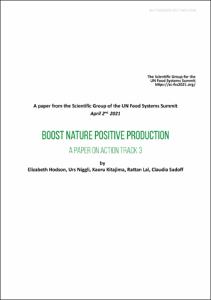Hodson, Elizabeth; Niggli, Urs; Kitajima, Kaoru; Lal, Rattan; Sadoff, Claudia: Boost Nature Positive Production : A paper on Action Track 3. Bonn: Center for Development Research (ZEF) in cooperation with the Scientific Group for the UN Food System Summit 2021, 2021.
Online-Ausgabe in bonndoc: https://doi.org/10.48565/scfss2021-q794
Online-Ausgabe in bonndoc: https://doi.org/10.48565/scfss2021-q794
@misc{handle:20.500.11811/9085,
doi: https://doi.org/10.48565/scfss2021-q794 ,
author = {{Elizabeth Hodson} and {Urs Niggli} and {Kaoru Kitajima} and {Rattan Lal} and {Claudia Sadoff}},
title = {Boost Nature Positive Production : A paper on Action Track 3},
publisher = {Center for Development Research (ZEF) in cooperation with the Scientific Group for the UN Food System Summit 2021},
year = 2021,
month = apr,
note = {Transforming food systems involves five action tracks: i) access to safe and nutritious food, ii) sustainable consumption, iii) nature-positive production, iv) equitable livelihood, and v) resilience to shocks and stress. The overall goal of Action Track 3 is to reconcile the need for the production system to meet the demands from growing populations and rising prosperity with the necessity of restoring the environment, improving the quality of soil, conserving biodiversity, and sustainably managing land, water and other natural resources. The strategy is to protect, manage and restore ecosystems: to “produce more from less” and set aside some land and water for nature. In this context, action at the landscape scale is key. Landscapes are where these actors and innovations come together. Nature-positive landscape-level interventions include system-based conservation agriculture, agroforestry, river basin management, bio-inputs, integrated soil fertility management, soil and water conservation and nutrient recycling. In particular, maintaining trees in landscapes, avoiding deforestation and promoting landscape restoration are critically important for protecting the soils, water resources and environmental services essential for sustaining production at multiple scales from regional to global. Such nature-positive approaches are best based on bottom-up and territorial processes, strengthened by scientific innovations and enabling policy environments. Translating science into transformative action also requires system-level governance and policy interventions that enable and provide incentives for farmers and land managers to adopt nature-positive practices. Greater public and private sector investment in research and innovation is needed, if we are to develop solutions and adequately scale the adoption of nature-positive production systems. Furthermore, a realignment toward nature-positive food systems requires awareness and empowerment on the part of producers and consumers. These concepts must be introduced to farmers through robust extension programs, with special attention paid to woman farmers. They must be taught in schools and broadcast to consumers. Ultimately, the aim should be to foster a fiveway dialogue between academic institutions, farmer and citizen groups, industry and policy makers to translate scientific knowledge into viable action.},
url = {https://hdl.handle.net/20.500.11811/9085}
}
doi: https://doi.org/
author = {{Elizabeth Hodson} and {Urs Niggli} and {Kaoru Kitajima} and {Rattan Lal} and {Claudia Sadoff}},
title = {Boost Nature Positive Production : A paper on Action Track 3},
publisher = {Center for Development Research (ZEF) in cooperation with the Scientific Group for the UN Food System Summit 2021},
year = 2021,
month = apr,
note = {Transforming food systems involves five action tracks: i) access to safe and nutritious food, ii) sustainable consumption, iii) nature-positive production, iv) equitable livelihood, and v) resilience to shocks and stress. The overall goal of Action Track 3 is to reconcile the need for the production system to meet the demands from growing populations and rising prosperity with the necessity of restoring the environment, improving the quality of soil, conserving biodiversity, and sustainably managing land, water and other natural resources. The strategy is to protect, manage and restore ecosystems: to “produce more from less” and set aside some land and water for nature. In this context, action at the landscape scale is key. Landscapes are where these actors and innovations come together. Nature-positive landscape-level interventions include system-based conservation agriculture, agroforestry, river basin management, bio-inputs, integrated soil fertility management, soil and water conservation and nutrient recycling. In particular, maintaining trees in landscapes, avoiding deforestation and promoting landscape restoration are critically important for protecting the soils, water resources and environmental services essential for sustaining production at multiple scales from regional to global. Such nature-positive approaches are best based on bottom-up and territorial processes, strengthened by scientific innovations and enabling policy environments. Translating science into transformative action also requires system-level governance and policy interventions that enable and provide incentives for farmers and land managers to adopt nature-positive practices. Greater public and private sector investment in research and innovation is needed, if we are to develop solutions and adequately scale the adoption of nature-positive production systems. Furthermore, a realignment toward nature-positive food systems requires awareness and empowerment on the part of producers and consumers. These concepts must be introduced to farmers through robust extension programs, with special attention paid to woman farmers. They must be taught in schools and broadcast to consumers. Ultimately, the aim should be to foster a fiveway dialogue between academic institutions, farmer and citizen groups, industry and policy makers to translate scientific knowledge into viable action.},
url = {https://hdl.handle.net/20.500.11811/9085}
}






